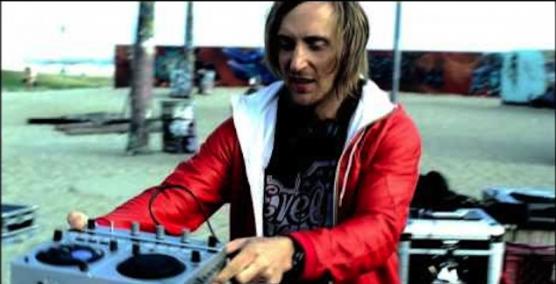Dear David,
Late last week, I learned that you had partnered with Chase bank to give Chase Visa or debit cardholders early access to your new album, Listen. Apparently, those who registered their cards with Apple Pay could download your album from iTunes three days before the rest of us.
That's smart, I guess? I mean, it's getting harder and harder to make money selling records, so when a brand like Chase comes calling, I'm sure it's tempting to sign on the dotted line.
But David, I'll be honest with you, the whole thing kind of sticks in my craw, and I was hoping we could talk about it.
It is understandable that you might not understand why this particular deal would not be a bad thing. (Apparently, you told BuzzFeed, "Collaborating is a part of what I do in my creative process and it made sense to collaborate with partners Chase and Apple Pay to do something that has not been done before." I mean, sure, right?) After all, you are French, and France is a country with strong social-democratic traditions, like 35-hour workweeks, generous childcare benefits, defiant trade unions, and a youthful minimum retirement age (just 62 years old—that means you've only got to put in 15 more years in the proverbial salt mines, and you can cash out!).
Perhaps you are unacquainted with the avarice and perniciousness of American capitalism, and perhaps you have missed the fact that Chase has recently become the poster boy, as it were, for precisely that.
As it happens, Rolling Stone's Matt Taibbi has been covering the misdeeds of JP Morgan Chase for years now. In a recent issue of the magazine, he goes in hard on the bank, as he describes its attempts to silence a former employee and whistleblower who uncovered "massive criminal securities fraud" in the bank's mortgage operations. It constitutes, Taibbi says, "one of the biggest cases of white-collar crime in American history."
Like the financial crisis itself, it's a little tricky for a layperson to understand, but the outlines are pretty clear: the bankers made huge profits by gaming the system and sticking taxpayers with the bill, and instead of being held accountable for their crimes, they paid the government what amounts to hush money in order to keep executives out of prison. In fact, two lawyers who represented Chase against the government went on to jobs in the SEC, while the bank's stock price is near five-year highs.
In other words, Chase epitomizes the worst misdeeds of our current era of corporate corruption and impunity. And so perhaps you can see how partnering with an entity—indeed, a criminal enterprise—like Chase might be perceived as taking the wrong side in America's ongoing class war.
Now, David, I have a confession to make. When I first read of your deal with Chase, I tweeted something rather unkindly and uncouth at you. I regret that; in fact, I regretted it almost immediately. For one thing, I've interviewed you, and you seem like a friendly and generally decent fellow; I had no cause to be so rude to you. Additionally, in phrasing my tweet the way I did, I just brought more negative energy into the world, which is something I would prefer to avoid doing. After all, with entities like JP Morgan Chase out there, who needs more bad vibes? We, the people, need to stick together. At the very least you've tried to set a positive example with the many feel-good hits in your own oeuvre; "One Love", right?
So what to do? After all, the Chase promotion is over. And your name, frankly, is attached to it. As Taibbi points out, it's possible there will still be a criminal case against Chase executives. Would you really want a weekend-long dalliance with those ne'er-do-wells to tarnish your reputation as a reliable purveyor of good-times pop? Do you really want your fans to be thinking about financial impropriety when they hear the chorus of "No Money No Love"?
David, I have a solution for you: Donate your fee from the Chase deal. But to whom, you ask. Up to you!
One possibility might be Pro Publica, a non-profit newsroom dedicated to investigative journalism in the public interest. Or, given the degree to which the financial crisis has exacerbated homelessness in the United States, you might consider donating to the Coalition for the Homeless.
Or how about this one: Since Chase was found, in 2012, to have wrongfully foreclosed on U.S. servicemembers and veterans, perhaps you could direct your money to an organization that takes care of America's veterans; Homes for Our Troops, the National Military Family Association, and Fisher House Foundation are all highly rated outfits.
I hope you take my suggestions to heart, David, and again, I hope you will forgive me for being a jerk to you on Twitter. To show there's no ill will, I'll even do this for you: Once you've donated your Chase fee to a charity of your choice, just let me know, and I will send you a photograph of myself making the "heart hands" gesture that you have popularized around the world, as a way of symbolizing that, truly, anything is possible "When Love Takes Over."
Thanks for your time, David.
With warm regards,
Philip Sherburne
















